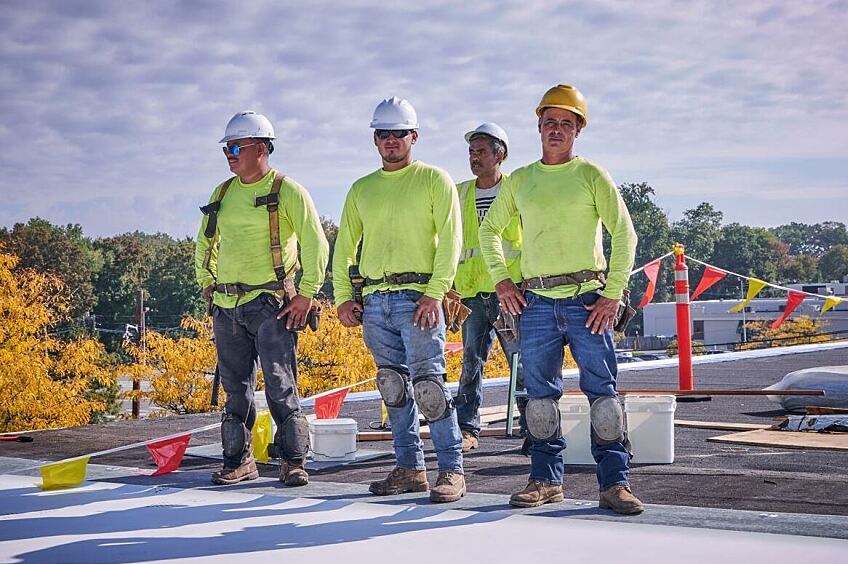Every roof is different, and that's especially true when comparing commercial vs residential roofing, also known as low-slope vs steep-slope roofing. Many roofing contractors start out installing residential roofs because they have a low cost of entry. The process requires minimal specialized equipment—most roofers are able to start out with a truck, a ladder, a nail gun, a compressor, and safety gear.
You can earn a great living installing residential roofs. But as your business grows, you may consider installing larger commercial roofs that provide steady work over weeks or even months. Commercial roofing also brings more opportunities for regular service and maintenance, helping you develop relationships with customers. When it comes time to replace their roof, they'll know your company can get the job done.
If you're interested in expanding into commercial roofing, it's important to understand the differences between commercial and residential roofing, from crew size to specialized equipment to financial considerations.
Using Specialized Equipment
Although you can install shingles with a nail gun, the same can't be said for commercial roofing installations. For instance, if you plan to install a thermoplastic single-ply membrane such as GAF EverGuard® TPO, you'll need to invest in hot air welding equipment to weld the seams and handheld welders for the flashing details.
If the system is specified to be an adhered installation, the job may require a spray rig to apply the adhesive efficiently and effectively. In the case of an induction welded system, RhinoBond® induction welding equipment helps secure the membrane and insulation to the roof deck without penetrating the membrane. This equipment can run into the tens of thousands of dollars.
Identifying Crew Size and Experience
A residential roofing crew can range anywhere from four to six workers, who are typically able to reroof an average-sized home in one day. Commercial roofing crews need more people and more time. Depending on the size of the building and the roofing materials involved, commercial roofing replacements can take anywhere from several days to months.
You'll also want to be sure to ensure your crews are properly trained and certified by the manufacturer so that you can offer system warranties or guarantees to building owners for their new roofs.
Reviewing Safety Measures
Safety comes first on every roofing job, and the safety requirements on commercial roofing projects can vary greatly from those on a residential roof. Prepare a comprehensive safety plan for each commercial roof that includes identifying roof access points, establishing safety perimeter lines at the roof edge, locating and flagging potential hazards such as skylights, and reviewing the need for any special fall protection equipment such as weighted anchors or parapet clamps. OSHA safety requirements are readily available in their guide for protecting roofing workers available on www.osha.org.
Considering Financial Concerns
While a residential roofing project may have a short life cycle for installation and payment, a large commercial roofing project can take months to install—and potentially months to get paid following the installation. Many large companies pay on a 30-, 60-, or even 90-day payment system, and will often work retainage into the contract. Retainage refers to a percent of every payment that is withheld until substantial completion of the project- which could mean when most other trades on the job have finished their work as well. You'll need to be sure that your company is in a financial position to wait that length of time before receiving payment, and ensure you're capable of completing the job by any date indicated on the contract to avoid liquidated damages.
The sales life cycle for a large commercial roofing project can take a long time as well. You'll need a good salesperson who can find jobs, build relationships, and work closely with your estimating team to develop a solid bid.
Partnering with Your Manufacturer
Navigating the differences in commercial vs residential roofing can raise new questions for roofers. As you expand your business in a new direction, GAF is here to help you find success with a robust training library and expert videos that allow you to learn at your own pace. This support is available through the Center for the Advancement of Roofing Excellence, which has a host of resources and training to fit your goals and the way you prefer to learn.
Get started by reaching out to your GAF territory manager, who can help you begin your journey in commercial roofing.
RhinoBond® is a registered trademark of OMG, Inc.



